新外研版八年级英语下册初二知识点总结
(外研版)初中英语笔记初二(下)
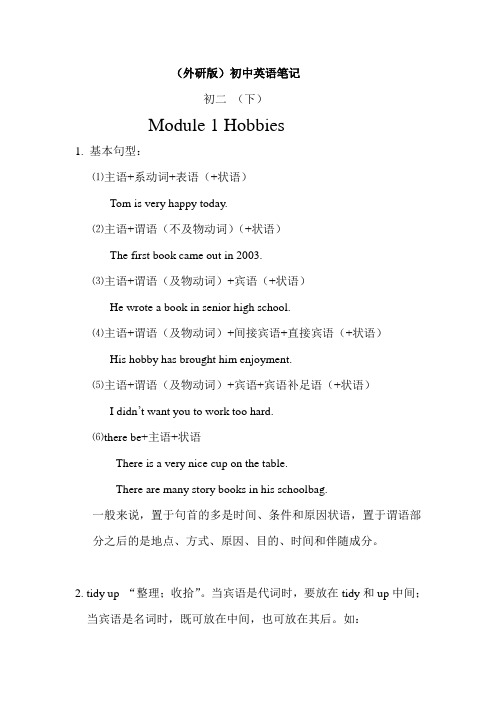
(外研版)初中英语笔记初二(下)Module 1 Hobbies1. 基本句型:⑴主语+系动词+表语(+状语)Tom is very happy today.⑵主语+谓语(不及物动词)(+状语)The first book came out in 2003.⑶主语+谓语(及物动词)+宾语(+状语)He wrote a book in senior high school.⑷主语+谓语(及物动词)+间接宾语+直接宾语(+状语)His hobby has brought him enjoyment.⑸主语+谓语(及物动词)+宾语+宾语补足语(+状语)I didn’t want you to work too hard.⑹there be+主语+状语There is a very nice cup on the table.There are many story books in his schoolbag.一般来说,置于句首的多是时间、条件和原因状语,置于谓语部分之后的是地点、方式、原因、目的、时间和伴随成分。
2. tidy up “整理;收拾”。
当宾语是代词时,要放在tidy和up中间;当宾语是名词时,既可放在中间,也可放在其后。
如:Your room is untidy. Can you tidy it up?The students tidied up the classroom.(类似的还有turn on, turn off, put on, write down等动词+副词形式)3. listen to sb. do sth. 听见某人做某事。
I often listen to him play the violin.(类似于see, hear等后面可以接不带to的动词不定式)4. 当play后面接表示乐器的名词时,需要在该名词前加上定冠词the;如:play the piano, play the flute(笛子)当play后面接表示球类的名词时,该名词前不接任何冠词。
新外研版八年级英语(下册)重点知识点总结

外研版八年级英语下册重点知识点Module1语法:系动词:一是(be:am,is,are,been,was,were),一觉得(feel),一好像(seem),一保持(keep),三变化(turn,become,get),四起来(smell,sound,look,taste),后跟形容词..11.三到达:arriveat(小地方),arrivein(大地方),getto=reach注意:跟home,here,there等副词时,不加介词.12.quite相当,很,相当于very,区别,quitea../quitean..而very只能放在a/an后13.with有,带有;和…一起;使用等.反义词without14.lovely:令人愉快的,可爱的修饰人或物alovelyafternoon/girllively:活泼的,生动的alivelylesson:一堂生动的课16.四个花费:take:Ittakessb.sometimetodosth./Ittooksb.sometimetodosth.Spend:Sb.spendsometime/moneyonsthSb.spendsometime/money(in)doingsth.Pay:Sb.paysomemoneyforsth.cost:sthcostsb.somemoney.,暗示.注意:词数70左右。
Ihaveanetfriend.SheisfromSydney,Australia.Thegirlisfifteenyearsold.Sheisthinwithtwo bigeyes.Shehaslongfairhair.Sheisfriendlyandoutgoing.Shealwayshasabigsmileonherface.S helikesreadingandchattingontheInternetwithherfriends.Shesaidthatreadingmadehergrowup asaperson.IfeelveryhappywhenIchatwithher.Ilikemynetfriendverymuch.IhopeIcangotoSyd neytoseeheroneday.Module2语法:现在完成时:表过去发生或已经完成的某一动作,对现在造成的影响和结果,或持续到现在的动作。
外研版初中八年级英语下册所有重点知识考点全总结
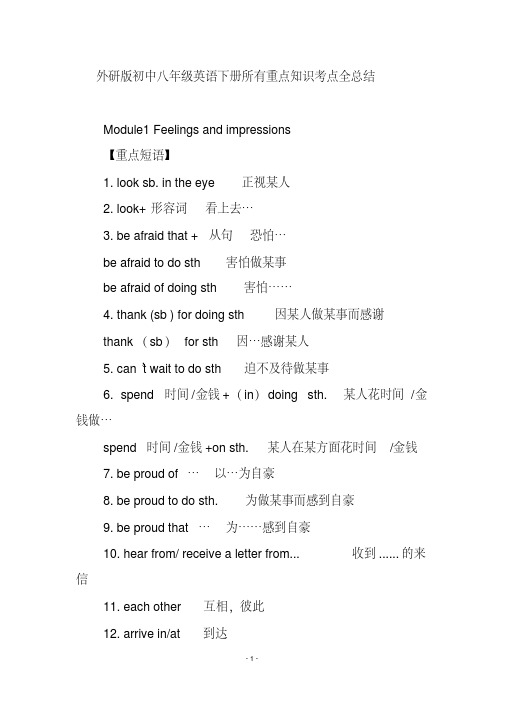
外研版初中八年级英语下册所有重点知识考点全总结Module1 Feelings and impressions【重点短语】1. look sb. in the eye 正视某人2. look+形容词看上去…3. be afraid that +从句恐怕…be afraid to do sth 害怕做某事be afraid of doing sth 害怕……4. thank (sb ) for doing sth 因某人做某事而感谢thank(sb)for sth 因…感谢某人5. can’t wait to do sth 迫不及待做某事6. spend 时间/金钱+(in)doing sth. 某人花时间/金钱做…spend 时间/金钱+on sth. 某人在某方面花时间/金钱7. be proud of…以…为自豪8. be proud to do sth. 为做某事而感到自豪9. be proud that…为……感到自豪10. hear from/ receive a letter from... 收到......的来信11. each other 互相,彼此12. arrive in/at 到达13. be good at 擅长,善于14. have a try 尝试15. on top 在上面,处于优势16. in the middle 在中间17. as well 也;还18. in the right way 以正确的方式19. be excited about 对...兴奋20. shake hands 握手21. close to 离......近【重点句型】1. 它闻起来不新鲜。
It doesn’t smell fresh.2. 每种东西都(尝起来)甜滋滋的。
Everything tastes so sweet.3. 多好闻的味道啊!What a delicious smell.4. ——你想来点尝尝吗?——好的,谢谢。
(完整版)外研版英语八年级下册知识点总结.docx
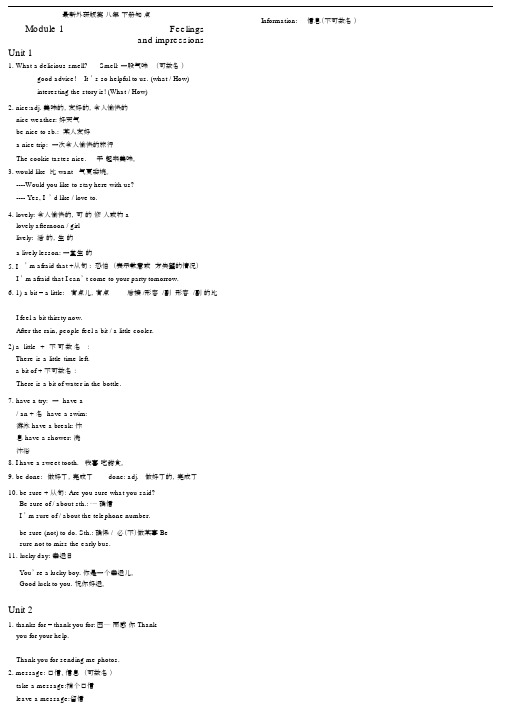
最新外研版英八年下册知点Information:信息(不可数名)Module 1Feelingsand impressionsUnit 11. What a delicious smell?Smell: 一股气味(可数名)_____ good advice! It ’ s so helpful to us. (what / How)_____ interesting the story is! (What / How)2.nice:adj. 美味的,友好的,令人愉快的nice weather: 好天气be nice to sb.: 某人友好a nice trip: 一次令人愉快的旅行The cookie tastes nice. 干起来美味。
3.would like 比 want 气更委婉。
----Would you like to stay here with us?---- Yes, I ’ d like / love to.4.lovely: 令人愉快的,可的修人或物 alovely afternoon / girllively: 活的,生的a lively lesson: 一堂生的5.I’ m afraid that +从句 : 恐怕(表示歉意或方失望的情况)I ’ m afraid that I can’ t come to your party tomorrow.6.1)a bit = a little: 有点儿,有点后接 /形容 /副形容 /副的比I feel a bit thirsty now.After the rain, people feel a bit / a little cooler.2)a little + 不可数名:There is a little time left.a bit of + 不可数名:There is a bit of water in the bottle.7.have a try: 一 have a/ an + 名 have a swim:游泳 have a break: 休息 have a shower: 洗沐浴8.I have a sweet tooth. 我喜吃甜食。
(完整版)外研版八年级下册Module8知识点整理

外研版八年级下册Module 8知识点整理一.重点单词hardly adv.几乎不;几乎没sights n.[用复数]风景;名胜thirsty adj.渴的waste v.&n.浪费;滥用kilometre n.千米;公里shape n.外形;形状human n.人wake v.唤醒;醒来somebody pron.某人;有人about adv.向四周;向各处path n.小路;路径pull v.(用手)拉,牵,扯二.重点短语1.time off休假2.in the city centre在市中心3.be famous for因……而著名4.take up占去(时间或空间)5.point out指出;指明6.at the top of.在……的顶端7.look like看起来像8.wake sb. up唤醒某人9.move about 四处走动10. not…any more不再11.do sightseeing 观光12. be careful小心13. be popular with受……欢迎三.用法集萃1.so...that+从句如此……以至于……2.welcome to+地点欢迎来到……3. hear sb. doing sth 听到某人正在做某事4. allow sb. to do sth 允许某人做某事5.promise to do sth.答应/许诺做某事6.without doing sth 没做某事7.hope to do sth希望做某事8.the+序数词十形容词最高级第几……的9. would like sb.to do sth. 想要某人做某事四.重点句型1.1 can hardly believe we're in the city centre.我几乎不能相信我们在市中心。
2.I don't think they allow people to swim in the lake.3.我认为他们不允许人们在湖里游泳。
新外研版英语八年级下册知识点与短语
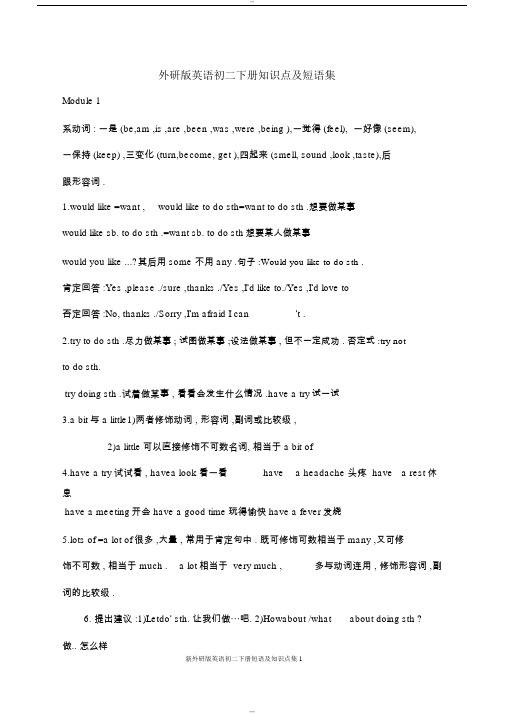
外研版英语初二下册知识点及短语集Module 1系动词 : 一是 (be,am ,is ,are ,been ,was ,were ,being ),一觉得(feel),一好像(seem),一保持 (keep) ,三变化(turn,become, get ),四起来(smell, sound ,look ,taste),后跟形容词 .1.would like =want , would like to do sth=want to do sth .想要做某事would like sb. to do sth .=want sb. to do sth想要某人做某事would you like ...?其后用some不用any .句子:Would you like to do sth .肯定回答 :Yes ,please ./sure ,thanks ./Yes ,I’d like to./Yes ,I’d love to否定回答 :No, thanks ./Sorry ,I’m afraid I can’t .2.try to do sth .尽力做某事;试图做某事;设法做某事,但不一定成功.否定式:try notto do sth.try doing sth .试着做某事,看看会发生什么情况.have a try试一试3.a bit与a little1)两者修饰动词,形容词,副词或比较级,2)a little可以直接修饰不可数名词, 相当于 a bit of4.have a try试试看, havea look 看一看have a headache 头疼 have a rest休息have a meeting开会have a good time玩得愉快have a fever发烧5.lots of =a lot of很多,大量,常用于肯定句中.既可修饰可数相当于many ,又可修饰不可数 , 相当于 much . a lot相当于very much ,多与动词连用,修饰形容词,副词的比较级 .6. 提出建议 :1)Letdo’ sth. 让我们做⋯吧. 2)Howabout /what about doing sth ?做.. 怎么样3)Why not do sth ?为什么不⋯ ?4)Would you like to do你愿意做⋯?.吗?5)Shall we do我们⋯?做⋯好吗?6)You’ d better(not) do ..你最好(不)做某事.7.Thanks for sth. =Thank you for sth.因⋯而感谢.后V+ing . Thanks to幸亏,由于,归功于 .8.leave a message留个口信 , take/have a message for sb.给某人带个口信 .9.hear from sb.=get /receive a letter from sb . 收到⋯的来信 hear about /of得悉,听说Hear out听完 hear to同意10.can’ t wait to do sth . 迫不及待做某事wait for等候⋯,后接等待的对象 ,名词或代词wait to do sth .等着做某事11.三到达 :arrive at ( 小地方 ),arrive in( 大地方 ),get to=reach 注意 : 跟home ,here ,there等副词时 ,不加介词 .12.quite相当 , 很, 相当于 very, 区别 , quite a ../quite an .. 而 very只能放在 a /an后13.with有,带有 ;和⋯一起;使用等 . 反义词 without14. 穿 :dress , 后跟人 ,dress oneself, dress sb . put on穿上,强调动作,wear ,穿着,强调状态 .15.be sure确信,相信be sure of /about sth .相信/对某事有把握16. 四个花费 :take:It takes sb. some time to do sth. /It took sb .some time todo sth .Spend :Sb. spend some time on sth ./ Sb spend some time (in) doing sth/Sb.spend money on sth .Pay:Sb. pay some money for sth.cost :sth cost sb .some money .17.四个也 :as well肯定,句末,不用逗号too,肯定,句末,逗号可有可无.either:否定句末 , also ,肯定句中,行前be后.18.proud .adj. be proud of为⋯而感到骄傲be proud to do sth .做某事很自豪 .pride. n. take pride in为⋯感到自⋯豪.;the pride of的骄傲⋯.19.How do you feel about对⋯感⋯?觉如何?与How do you like⋯?20.at first起初,开始,常位于句首或句末,反义词.at last最后,终于first of all ,首先,用作插入语,说明顺序,后接next ,then , at first ,指刚开始做某事的时候 , 暗示后来的情况有所改变.21.few /a few修饰可数名词,little /a little修饰不可数名词,有a表示有,没有a表示没有 .22.way的短语:in this way用这种方式, in the right way用正确的方法, the wayof 做 .. 的方式in the way 阻碍 , 妨碍 ; on the way to在去⋯的路上 by the way顺便说一下 .23.be afraid of害怕 , 后接名词 ,代词或动名词 be afraid to do sth .害怕做某事24.each other互相 25.be nervous about对⋯感到紧张26. 问外貌 :What+do/does /did + 主语 +look like ?问性格 :What +be +主语 +like ?27.be friendly to sb. 对某人友好 -28.be good at =do well in 擅长 , 后跟 doing sth .或名词。
八下外研版英语知识点梳理
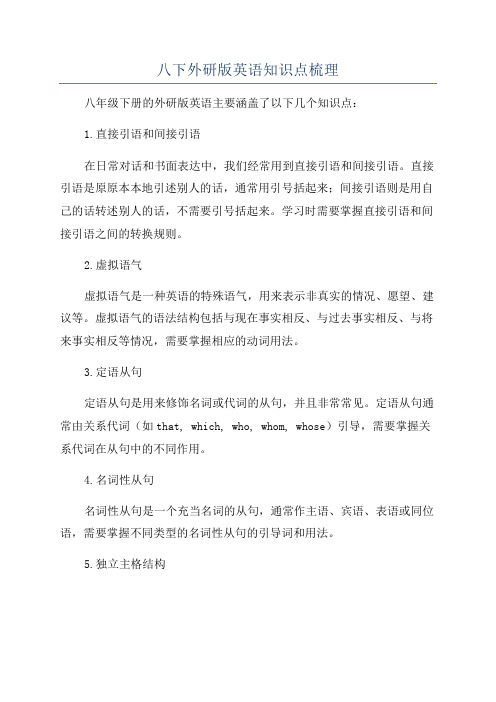
八下外研版英语知识点梳理八年级下册的外研版英语主要涵盖了以下几个知识点:1.直接引语和间接引语在日常对话和书面表达中,我们经常用到直接引语和间接引语。
直接引语是原原本本地引述别人的话,通常用引号括起来;间接引语则是用自己的话转述别人的话,不需要引号括起来。
学习时需要掌握直接引语和间接引语之间的转换规则。
2.虚拟语气虚拟语气是一种英语的特殊语气,用来表示非真实的情况、愿望、建议等。
虚拟语气的语法结构包括与现在事实相反、与过去事实相反、与将来事实相反等情况,需要掌握相应的动词用法。
3.定语从句定语从句是用来修饰名词或代词的从句,并且非常常见。
定语从句通常由关系代词(如that, which, who, whom, whose)引导,需要掌握关系代词在从句中的不同作用。
4.名词性从句名词性从句是一个充当名词的从句,通常作主语、宾语、表语或同位语,需要掌握不同类型的名词性从句的引导词和用法。
5.独立主格结构独立主格结构是一个形容词、名词或动词-ing 形式作主语,带有一个名词和一个介词短语。
独立主格结构通常用于句子的开头,也可以用于句子末尾,需要掌握相应的句子结构和用法。
6.过去完成时过去完成时是表示过去其中一时刻之前已经完成的动作或状态。
过去完成时的构成是had + 过去分词,学习时需要掌握它与其他过去时态的区别和正确使用。
7.被动语态被动语态是表示主语是动作的承受者,而不是执行者的句子。
被动语态的构成是be + 过去分词,学习时需要学会将主动句转为被动句,并正确使用被动语态。
8.宾语从句宾语从句是一个充当宾语的从句,通常由连接词that、if, whether等引导。
学习时需要掌握宾语从句的语法结构和连接词的用法。
9.定语从句中的非限制性定语从句非限制性定语从句是指对主句的名词或代词进行补充说明的定语从句,常由which引导。
学习时需要注意非限制性定语从句与限制性定语从句的区别,以及非限制性定语从句的标点符号使用。
外研版八年级下册语法知识点

外研版八年级下册语法知识点本文档将介绍外研版八年级下册涉及的主要语法知识点。
一. 动词的时态1. 一般现在时:表示经常性的行为、存在或事实;使用动词原形。
2. 现在进行时:表示正在进行的动作;使用be动词的现在分词形式+动词-ing。
3. 一般过去时:表示过去发生的动作;动词过去式。
4. 过去进行时:表示在过去某一时间正在进行的动作;过去式的be动词+动词-ing。
二. 名词性从句1. 主语从句:用作句子主语的从句。
2. 宾语从句:用作句子宾语的从句。
3. 表语从句:用作句子表语的从句。
4. 定语从句:用来修饰名词或代词的从句。
三. 动词的语态1. 主动语态:表示主语是动作的执行者。
2. 被动语态:表示主语是动作的承受者。
四. 状语从句1. 时间状语从句:表示时间的从句。
2. 地点状语从句:表示地点的从句。
3. 原因状语从句:表示原因的从句。
4. 结果状语从句:表示结果的从句。
五. 形容词和副词的比较级与最高级1. 形容词比较级:表示两者间的比较;原形+er。
2. 形容词最高级:表示三者或三者以上的比较;原形+est。
3. 副词比较级:表示程度上的比较;在副词前加more。
4. 副词最高级:表示程度上的最高水平;在副词前加most。
六. 陈述句、疑问句和祈使句的变化1. 陈述句:陈述事实、真理或观点;句子结构通常为主语+谓语动词+宾语。
2. 疑问句:用于问问题,通常以助动词、情态动词或疑问词开头。
3. 祈使句:用于表示请求、命令、建议等;直接使用动词原形开头。
以上是外研版八年级下册涉及的主要语法知识点。
希望对你有所帮助!。
- 1、下载文档前请自行甄别文档内容的完整性,平台不提供额外的编辑、内容补充、找答案等附加服务。
- 2、"仅部分预览"的文档,不可在线预览部分如存在完整性等问题,可反馈申请退款(可完整预览的文档不适用该条件!)。
- 3、如文档侵犯您的权益,请联系客服反馈,我们会尽快为您处理(人工客服工作时间:9:00-18:30)。
外研版英语八年级下册知识点总结Module 1 Feelings and impressionsUnit 11. What a delicious smell? Smell:一股气味(可数名词)_____ good advice! It’s so helpful to us. (what / How)_____ interesting the story is! (What / How)2. nice:adj. 美味的,友好的,令人愉快的nice weather: 好天气be nice to sb.:对某人友好a nice trip: 一次令人愉快的旅行The cookie tastes nice. 这块饼干尝起来美味。
3. would like 比want 语气更委婉。
----Would you like to stay here with us?---- Yes, I’d like / love to.4. lovely: 令人愉快的,可爱的修饰人或物a lovely afternoon / girllively: 活泼的,生动的a lively lesson:一堂生动的课5. I’m afraid that + 从句: 恐怕(表示歉意或让对方失望的情况)I’m afraid that I can’t come to your party tomorrow.6. 1) a bit = a little:有点儿,有点后接/形容词/副词\形容词/副词的比较级I feel a bit thirsty now.After the rain, people feel a bit / a little cooler.2) a little + 不可数名词:There is a little time left.a bit of + 不可数名词:There is a bit of water in the bottle.7. have a try: 试一试have a / an + 名词have a swim:游泳have a break:休息have a shower:洗沐浴8. I have a sweet tooth. 我喜欢吃甜食。
9. be done: 做好了,完成了done: adj. 做好了的,完成了10. be sure + 从句:Are you sure what you said?Be sure of / about sth.: 对……确信I’m sure of / about the telephone number.be sure (not) to do. Sth.: 确保/ 务必(不)做某事Be sure not to miss the early bus.11. lucky day:幸运日You’re a lucky boy. 你是一个幸运儿。
Good luck to you. 祝你好运。
Unit 21. thanks for = thank you for: 因……而感谢你Thank you for your help.Thank you for sending me photos.2. message: 口信、信息(可数名词)take a message:捎个口信leave a message:留信Information: 信息(不可数名词)a piece of information ,some information3. hear from sb.= get / receive a letter from sb. : 收到某人的来信I heard from my uncle last week.= I got / received a letter from my uncle last week.4. can’t wait to do sth. : 等不及/ 迫不及待做某事I can’t wait to open the present.5. quite:1) quite a / an + 形容词+ 名词quite a nice boy:一个相当好的男孩。
2) quite 修饰动词时放在动词前He quite likes maths. 他很喜欢数学。
very:1) a very + 形容词+ 名词a very nice boy2) very 与much合在一起修饰动词时,位于句末。
He likes English very much.6. sound like: 听起来(像)The music sounds very beautiful.7. 1) sb. spend some time/money (in) doing sth.:某人花费时间/钱做某事Don’t spend too much time (in) playing computer games.2) sb. spend some time / money on sth. :某人花时间/ 钱在某事/某物上I spent ten yuan on this book.Many people spned their free time on their hobbies.8. be proud of sb. / sth. : 以某人/ 某事为自豪Parents are proud of their children.We’re proud of our country.9. be good at sth. / doing sth.= do well in sth. / doing sth. 擅长某事/ 做某事I’m good at English / swimming.= I do well in English / swimming.10. How do you feel about…?= What do you think of …?= How do you like…?How do you feel about the film?= What do you think of the film?11. in: 在多久之后,常用于将来时,对其提问用how soon--- How soon will you leave Beijing?--- I’ll come back in three days.12. how to do things: 疑问词+ 不定式,在句中可作主语、宾语、表语1) I don’t know what to do.= I don’t know what I should do. (作宾语)疑问词加不定式作宾语时可以转换成宾语从句。
2) When to hold the meeting hasn’t been decided. (作主语)3) His dream is how to be a good scientist. (作表语)4) I don’t know what to do.= I don’t know how to do it.13. 1) be afraid of sb. / sth. : 害怕某人/某物I’m afraid of doctors / dogs.2) be afraid of doing sth.: 害怕做某事I’m afraid of flying / going out at night.3) be afraid to do sth.: 害怕做某事I’m afraid to swim across the river.4) I’m afraid that: 恐怕I’m afraid that you must study hard.语法:表示感觉和知觉的系动词也称感官系动词1. 五个表示感觉和知觉的系动词与眼、耳、口、鼻、手相关系。
look, sound, taste, smell, feel + 形容词He feels tired after work.2. 感官系动词后可接介词like, like后常接名词。
His idea sounds like fun .3. 感官系动词的句型结构与be 不同,其否定形式和疑问形式要借助动词do。
The food tastes delicious.变成否定句→ The fo od doesn’t taste delicious.变成一般疑问句→ Does the food taste delicious?4. 持续系动词,用来表示主语继续或保持一种状况或态度,主要有keep, remain, stayThe weather will keep warm for 7 days.5. 变化系动词有become, grow, turn, get, go等。
书面表达在英语学习中,与北京阳光中学的同学朝夕相处,其中Daniel的善良和助人为乐等优秀品质给我们留下了深刻的印象。
请根据下面提示,用英语写一篇短文。
提示:1.Personality: helpful—help old woman cross the road kind—work at the Helping Hands Clubcreative—creative a TV programme点拨:人物介绍(年龄、外貌、身份、性格)→ 典型事例(性格、品质)→人物评价(喜爱、夸赞)My friend DanielMy friend Daniel comes from Beijing Sunshine Secondary School. He has a round face and often wears a pair of glasses. He is good at playing computer games, but he dislikes sports. He has many good personal qualities. He is helpful. He often helps his classmates with the homework. He also helps old woman cross the road. He is kind to others. He works at the Helping Hands Club. He is creative. For example, he can create a TV programme. He is generous to his friends. He likes to share his things with them. So I want to be a person like Daniel from now on and get on well with everyone.Module 2 ExperiencesUnit 11. 1) enter = take part in = join in 参加enter a competition: 参加比赛2) enter = come / go into 进入Please enter the classroom.2. ever: 曾经、从来,用于现在完成时的一疑问句、否定句。
